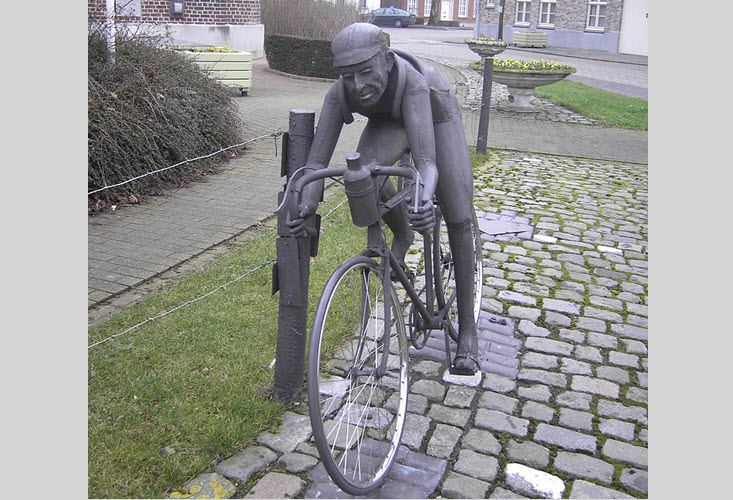The Tour of Flanders: History and Significance

Statue in honour of Briek Schotte in Kanegem. Schotte won the race twice and holds a record 20 participations between 1940 and 1959| Image courtesy: commons.wikimedia
The Tour of Flanders also known as De Ronde (“The Tour”), is an annual road cycling race held in Belgium every spring. The most important cycling race in Flanders, it is part of the UCI World Tour and organized by Flanders Classics. Its nickname is Vlaanderens Mooiste.
History of tour of Flanders
The Tour of Flanders is a one-day road cycling race held annually in Belgium, usually in early April. It is one of the five Monuments of cycling, which are the oldest and most prestigious one-day races in the world. The race has a long and fascinating history that dates back to the early 20th century.
The first Tour of Flanders was held in 1913 and was organized by Karel Van Wijnendaele, a journalist and cycling enthusiast. The race was initially conceived as a way to promote his newspaper, Sportwereld, and to showcase the beauty and toughness of the Flemish countryside. The first edition was won by Paul Deman, a Belgian cyclist who also won the first edition of the Paris-Roubaix race.
Over the years, the race has undergone many changes, both in terms of its route and its status within the cycling world. The race was suspended during World War I and II, and in the post-war years, it became a key event in the calendar of the newly formed UCI Road World Cup. The route of the race has also changed over time, with the inclusion of new climbs, cobbled sections, and more challenging terrain.
The Tour of Flanders is known for its grueling and challenging course, which includes many steep climbs and cobbled sections. The race has become a symbol of Flemish cycling culture and is deeply ingrained in the history and identity of the region. It attracts the top cyclists from around the world and is considered one of the most prestigious and difficult races on the cycling calendar.
Over the years, many legendary riders have won the Tour of Flanders, including Eddy Merckx, Johan Museeuw, Tom Boonen, and Fabian Cancellara. The race has also produced many memorable moments and dramatic finishes, making it a beloved and iconic event in the world of cycling.
100th tour of Flanders
The 100th Tour of Flanders was a cycling race that took place on 13 April 2016. It is one of the five “Monuments” of professional cycling and is one of the most prestigious one-day races in the world. The race covered a total distance of 255.9 km, starting in Bruges and finishing in Oudenaarde, Belgium. The route included several of the iconic cobbled climbs and sections, such as the Oude Kwaremont, the Paterberg, and the Koppenberg.
The race was won by Peter Sagan, a Slovakian cyclist, who attacked the final climb of the Paterberg and held on to win solo.
This victory was a significant one for Sagan, as it was his first victory in a “Monument” race, and it also marked his transition from being primarily a sprinter to a more versatile and complete rider.
on 3 April 2016, Google celebrated the Start of the 100th tour of Flanders.
Significance of tour of Flanders
The Tour of Flanders, also known as the Ronde van Vlaanderen, is one of the most prestigious and important one-day races in the professional cycling calendar. Here are some of the key reasons why the race is significant:
- Cycling culture: The Tour of Flanders is deeply ingrained in the history and identity of the Flemish region of Belgium. It is a symbol of the region’s cycling culture and is a key event in the local calendar.
- Course: The race is known for its grueling and challenging course, which includes steep climbs and cobbled sections that test the riders’ skills and endurance. It is one of the toughest races on the cycling calendar and attracts the top cyclists from around the world.
- Tradition: The Tour of Flanders has a long and fascinating history that dates back over a century. It is one of the five “Monuments” of cycling, which are the oldest and most prestigious one-day races in the world.
- Winners: The race has produced many legendary riders who have won multiple times, including Eddy Merckx, Johan Museeuw, Tom Boonen, and Fabian Cancellara. Winning the Tour of Flanders is a significant achievement in the career of any professional cyclist.
- Fans: The race has a passionate and dedicated fan base, with thousands of spectators lining the route each year to cheer on their favorite riders. The atmosphere at the race is electric and adds to the overall significance of the event.
Overall, the Tour of Flanders is a significant and beloved event in the world of cycling, with a rich history, challenging course, and passionate fan base.
Observer Voice is the one stop site for National, International news, Sports, Editor’s Choice, Art/culture contents, Quotes and much more. We also cover historical contents. Historical contents includes World History, Indian History, and what happened today. The website also covers Entertainment across the India and World.

